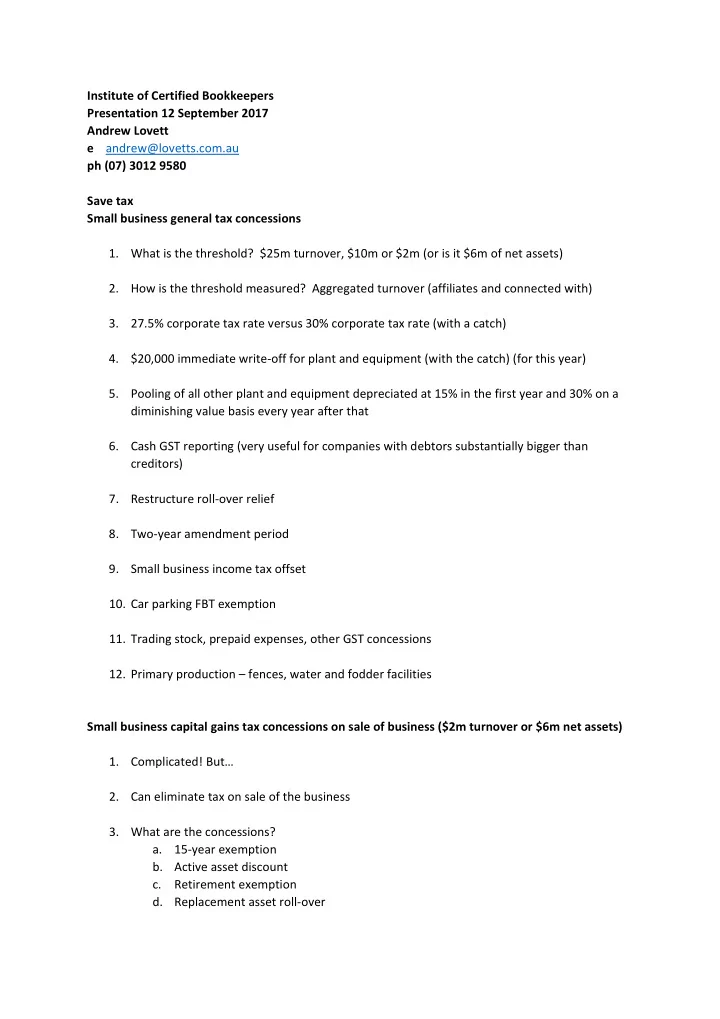

Institute of Certified Bookkeepers Presentation 12 September 2017 Andrew Lovett e andrew@lovetts.com.au ph (07) 3012 9580 Save tax Small business general tax concessions 1. What is the threshold? $25m turnover, $10m or $2m (or is it $6m of net assets) 2. How is the threshold measured? Aggregated turnover (affiliates and connected with) 3. 27.5% corporate tax rate versus 30% corporate tax rate (with a catch) 4. $20,000 immediate write‐off for plant and equipment (with the catch) (for this year) 5. Pooling of all other plant and equipment depreciated at 15% in the first year and 30% on a diminishing value basis every year after that 6. Cash GST reporting (very useful for companies with debtors substantially bigger than creditors) 7. Restructure roll‐over relief 8. Two‐year amendment period 9. Small business income tax offset 10. Car parking FBT exemption 11. Trading stock, prepaid expenses, other GST concessions 12. Primary production – fences, water and fodder facilities Small business capital gains tax concessions on sale of business ($2m turnover or $6m net assets) 1. Complicated! But… 2. Can eliminate tax on sale of the business 3. What are the concessions? a. 15‐year exemption b. Active asset discount c. Retirement exemption d. Replacement asset roll‐over
Save tax Personal services income (PSI) 1. Major issue with clients that are consultants and big push by large organisations to contract consultants’ companies rather than employ consultants 2. If PSI is attributed from the company/trust to the individual, then the income is simply “plucked” out of the company/trust tax return and “plonked” into the individual’s tax return 3. How do you avoid that from happening? 4. PSI is not attributed to the individual if it is earned from a Personal services business? 5. The five tests: a. The Results test requires that at least 75% of the income is for achieving a result where the contractor provided tools, plant and equipment and was responsible for rectifying any defects ‐ pass this on your out of it! b. The 80% test requires that less than 80% of PSI earned by an individual comes from a customer group ‐ pass this and you need to also pass one of the following four tests: i. The Unrelated Clients test requires that you have multiple clients and that you advertise for work ii. The Business Premises test requires that business premises are maintained throughout the year and the business is mainly conducted from them, you have exclusive use of the premises and they are physically separate from your customer and your home (or other premises you use for private purposes) iii. The Employment test requires that at least 20% of the principal work is performed by an employee or subcontractor that is not your spouse or other associate (except for an apprentice)
Build wealth We like: 1. Exchange traded funds because they substantially take the “management risk” out of investments. ETFs are traded on stock exchanges here and abroad and are generally unit trusts which own underlying shares in proportion to their index weighting. They have low management fees and performed in accordance with the index for that market, segment or region. 2. An international outlook because Australia is such a small percentage of the world investment market and greater diversification can be achieved by pursuing the world’s best industry segments in their home countries/regions. 3. Entry (and exit) by dollar cost averaging 4. Receiving dividends and distributions rather than automatic reinvestments 5. Reviewing quarterly and rebalancing yearly 6. Broad industry and geographic diversification but in the best in class E.Multi F.Prop'y / Segment / Region A.Cash B.Bonds C.Gold D.Short Segments I'structure 1.Global 10% 4% 2.Australia 10% 5% 3.USA/Canada 4.Europe 6% 5.China 6.India 7% 7.East Asia 6% 8.Latin America 9.Africa Totals 10% 15% 4% 0% 12% 7% Expand internationally An Australian taking an offshore expat appointment 1. Tax residency is key, particularly if you’re working in the Middle East or some other low tax jurisdiction (like Singapore) 2. The rules are set out in: a. Our taxation legislation
b. The overseas country’s legislation c. Treaties between countries known as double tax agreements 3. Where is home? Where is family? Where are work and social relations? An Australian business looking to expand internationally Where there is a business structure, the default outcome is to pay double tax. This is particularly the case where you have an Australian company owning a foreign business branch or foreign company. Careful structuring can reduce the impact of double taxation. Here is a recent example with structuring a business venture in the USA (an example of international structuring): 1. The Australian owners held their interest in for family trusts 2. The U.S.‐based owner held his interest in his own US company 3. The four Australian owners set up a unit trust with the units being held equally by their family trusts. They undertake the central management and control of the unit trust in Australia. 4. The US owner and the unit trust became members of a US Limited Liability Company (LLC). The central management and control of the LLC is undertaken by the US owner and board meetings that occurred in the USA. 5. For US tax purposes, the LLC is treated as a partnership and the unit trust lodges a US tax return and pays corporate tax there 6. The unit trust can “distribute” the US tax it pays as a foreign income tax offset to the family trusts. The family trusts can then on distribute that foreign income tax offset to an individual that is a beneficiary in the respective family group. Disclaimer : LOVETTS has a limited Australian financial services licence and is a tax agent. This information is general and for guidance purposes only and you should always seek specific advice that takes account of your direct circumstances before making any decisions about investments or tax.
Recommend
More recommend